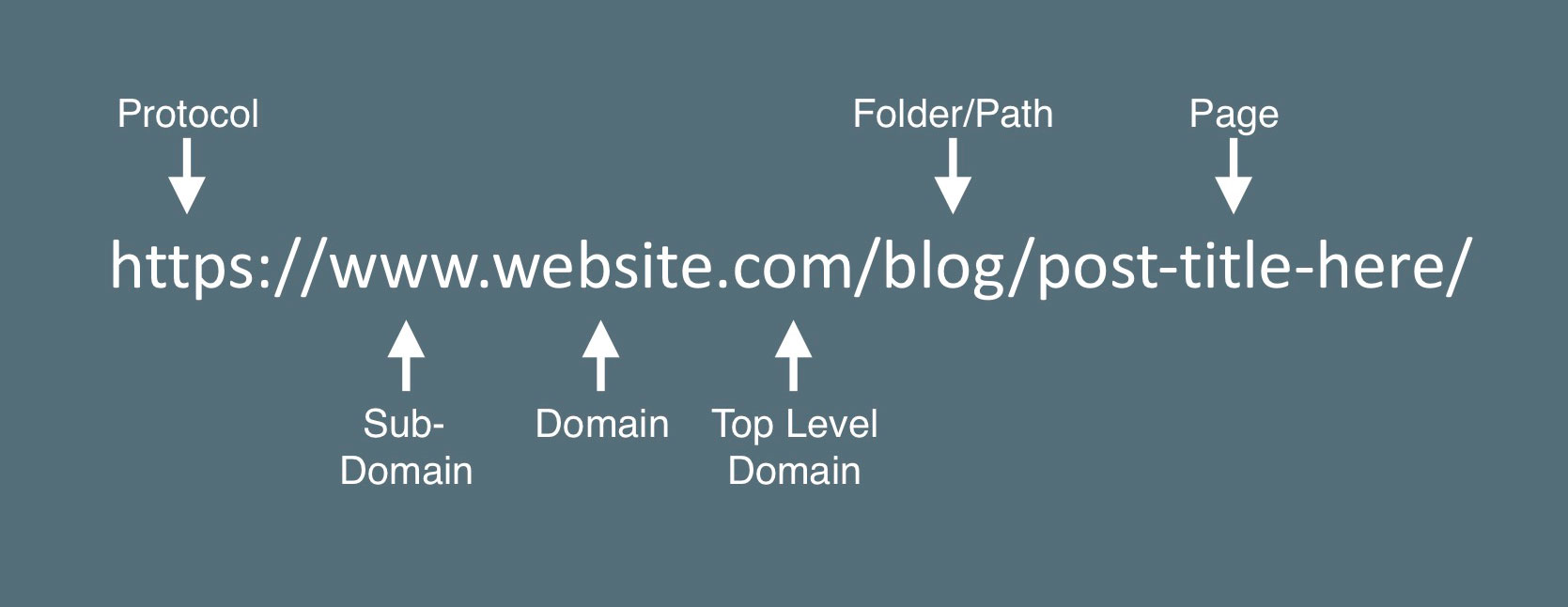Many people will come to your website by clicking on a link, so you may wonder if it really matters what's in the URL of a specific page.
You might be surprised to learn that rules for writing URLare very important for on-site SEO.

The Perfect URL Structure for SEO! Best Practices For Improved Ranking
Why Does URL Structure Matter?
There are a few key reasons why your URL structure is important.
- First, Google has to know what each page in its index is about if it wants to give searchers results that are always useful. Google looks at the URL as one of the most important parts of a page to figure out what it is about.
- Next, a site's users will find it easier to get around if the URLs are easy to understand. If someone looking for clothes on a website lands on the page www.clothesretailer.com/womens/dresses/nameofspecificdress, they know the page is about women's clothes or dresses, since those are the last two parts of the html code. Smart web users also know that they can delete the last few parts of the URL (dresses/nameofspecificdress) to get back to the larger selection of women's clothes.
- And finally, what makes a good URL structure easy to understand for users is also good for search engines. The search enginecrawler can more easily figure out how the different pages on your site relate to each other. For example, it can see that a certain item belongs in the same category as other dresses, even if the word "dress" isn't in the product name, which belong in the larger category of women's clothes on the site. This helps the crawler figure out what the different parts of the site are about and how they relate to each other.
As a bonus, adding those extra categories before the specific keyword or product name in your URL adds some more relevant keywords without making your URL look spammy.
That gives Google a little bit more information to make sure it knows what's on the page and what keywords it should show up for.
SEO Best Practices For Structuring URLs
Use A Single Domain And Subdomain As Much As Possible
Given how many people have moved their contentfrom a subdomain to a subfolder and seen better results, it's hard to argue against this (or, worse, moving content to a subdomain and losing traffic).
Whatever rules search engines use to decide if content should get the same ranking as its parent domain don't seem to work very well for subdomains.
That doesn't mean it can't work, and if a subdomain is the only way you can set up a blog or make the content you need, it's better than nothing.
But it's much more likely that your blog will do well in the rankings and help the rest of your site's content do well if it's all on one sub and root domain.
The More Readable By People, The Better
It shouldn't come as a surprise that search engines like URLs that are easy for people to read.
Accessibility has always been a part of SEO, but it has never been more important than it is today, when engines can use advanced user and usage data signals to figure out what people are interested in and what they aren't.
The URL doesn't have to be clean and perfect in every way, but it does have to be easy to understand and, hopefully, interesting to people looking for its content.
Keywords In URLs - Still A Good Thing
Still, it's a good idea to use the keywords you're trying to rank for in your URLs.
Several things make this true.
First, keywords in the URL help people who see it on social media, in an email, or as they hover over a link to click it know that they're getting what they want and expect.
Second, URLs are often copied and pasted, and when there's no anchor text in a link, the URL itself is used as the anchor text (which is still a powerful input for rankings).
Third, keywords in the URL show up in search results, and research has shown that the URL is one of the most important things searchers look at when deciding which site to click on.
It's important to do thorough keyword research, especially if you use keywords in your URL.
Keyword Explorer is a free tool that we use and recommend if you want to get started.
Shorter > Longer
In general, URLs that are shorter are better.
You don't have to go overboard with this, and if your URL is already between 50 and 60 characters, you don't have to worry about it at all.
But if your URLs have 100 or more characters, you might be able to rewrite them and get more out of them.
This isn't a problem with Google or Bing directly, since they can easily handle long URLs.
The problem is with how easy it is to use and how the user feels about it.
Shorter URLs are easier to read, copy and paste, share on social media, and embed. This might not make much of a difference in terms of sharing or spreading, but every tweet, like, share, pin, email, and link counts (either directly or, often, indirectly).
Including Stop Words Isn't Necessary
It's not necessary to include stop words (like and, or, but, of, the, a, etc.) in the URL if your title or headline has them.
You don't have to leave them out, but it can help make a URL shorter and easier to read in some situations.
Use your best judgment based on how easy it is to read and how long it would be.
In the URL of this post, for example, you can see that I left "for" in because I think it's easier to read with the stop word than without it, and it doesn't add too much to the length of the URL.
Hyphens And Underscores Are Preferred Word Separators
For the first time in all the years I've been updating this piece, I forgot to say to avoid using underscores to separate words in URLs.
Over the past few years, search engines have figured out how todeal with this problem and now treat underscores and hyphens in the same way.
Spaces can work, but they show up strangely in URLs as "%20," which makes your pages harder to read.
If you can, try to avoid them. In a modern CMS, this should be easy to do.
Overusing Keywords Makes Your Site Look Spammy
Repetition doesn't help your search rankings. Google and Bing no longer use algorithms that favor a keyword that shows up more than once in a URL string.
Overusing keyword matching or repetition in your URLs can hurt your chances of getting a click, which can hurt your rankings.
People Also Ask
What Is Proper URL Format?
A URL is made up of a protocol, a domain name, and a path, which is the exact subfolder structure where a page is located. The basic format of a URL is as follows:
protocol:/domain-name.top-level-domain/path.
The protocol tells a browser how to get information about a given resource.
How Do You Write A URL In A Sentence?
(1) www.lonelyplanet.com is the web address for the Lonely Planet travel center.
(2) This way, you can drop the URL of your site into the conversation when people post messages about your site that are relevant to it.
(3) A label will pop up with the full URL on it.
How Do I Create A Free URL?
Make your free URL with Google Sites.
With one Google account, you can make more than one website and give each one its own address.
You can use one of Google's layout templates, or you can use the HTML editor to make your own.
Conclusion
Here are some suggestions for how to write your urls.
They are based on businessdecisions, and it's better to keep this in mind and make it a part of us at the beginning of the project than to change in the middle of it.
Despite all of this, SEOis hard to master, and it is always changing as Google tries to improve the quality of search results.
By working on your URL names, you can probably expect your page ranking to go from 300 to 200, but not from 100 to 1.
SEO is also affected by many other things.
This is only a very tiny bit of it.


